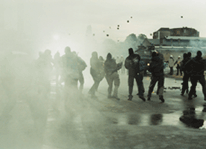 The objective of the APSA Task Force on Political Violence and Terrorism is to assess the contribution of political science to the understanding of how trends in civil violence affect domestic and international political order and to share findings with the public. From APSA President Margaret Levi:
The objective of the APSA Task Force on Political Violence and Terrorism is to assess the contribution of political science to the understanding of how trends in civil violence affect domestic and international political order and to share findings with the public. From APSA President Margaret Levi:
With the goal of enriching public understanding of the political violence and terrorism that so threaten national security, the American Political Science Association has constituted a Task Force on Political Violence and Terrorism, chaired by Professor Martha Crenshaw, Stanford University. As with the earlier APSA Public Presence Task Forces, there are two primary and interdependent aims of this task force: first, to clarify what political scientists know on the subject; and, second, to covey this knowledge in a way that makes it accessible and useful to the media, policy-makers, an informed public (including our own members who are not specialists in the given area), and students. By making our expertise relevant to the debate, we hope to help raise the quality of public discourse. Read More!
A Statement on Sources
The task force received 81 syllabi in response to our request for support on this project. From these we constructed this guide to to political science resources on political violence and terrorism. The guide identifies readings on each of 5 major categories:
- Terrorism and Counter-Terrorism
- Civil War and State Failure
- Peacekeeping Operations and Nation Building
- International Security in a Changing World
- Genocide, Politicide, and Human Rights
In addition, the guide provides a summary of select regional studies, identifies relevant datasets, and provides links to exemplary syllabi in each of the first four categories.
The articles and books in the guide are derived from many syllabi sent to the APSA Task Force by its members. Those chosen for inclusion in this general guide as the most salient political science contributions are those that met one of two criteria: (1) they have broad appeal; or (2) they make a unique contribution to our understanding of terrorism and political violence from a political science perspective. Exemplary syllabi were selected that exhibited the most depth and comprehensiveness. Our goal was to identify syllabi that would challenge the very best students in a semester length course, but could be edited down to fit instructors' specific needs.
Syllabi
The articles and books in the guide are derived from many syllabi sent to the APSA Task Force by its members. Those chosen for inclusion in this general guide as the most salient political science contributions are those that met one of two criteria: (1) they have broad appeal; or (2) they make a unique contribution to our understanding of terrorism and political violence from a political science perspective.
View syllabi!
Exemplary syllabi were selected that exhibited the most depth and comprehensiveness. Our goal was to identify syllabi that would challenge the very best students in a semester length course, but could be edited down to fit instructors' specific needs.
Read more!
Draft Task Force Reports
"How Political Violence Ends: Paths to Conflict Deescalation and Termination""Consolidating Peace and Mitigating Conflict in the Aftermath of Violence"
Task Force Members
Martha Crenshaw
Stanford University, Chair
Robert H. Bates
Harvard University
Jeannine Bell
Indiana University
Christian Davenport
University of Maryland
Donatella Della Porta
European University Institute
Fen Hampson
Carleton University
Stathis N. Kalyvas
Yale University
David D. Laitin
Stanford University
Margaret Levi, former APSA President
University of Washington, Seattle
Jack S. Levy
Rutgers University
T. David Mason
University of North Texas
Cynthia McClintock
George Washington University
Marc Ross
Bryn Mawr College
Ignacio Sanchez-Cuenca
Juan March Institute - Madrid
Joanna Vecchiarelli Scott
Eastern Michigan University
Barbara F. Walter
University of California - San Diego
Elisabeth Jean Wood
Yale University